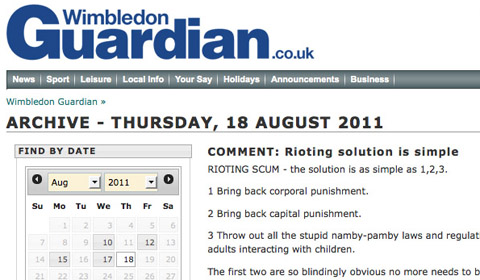The Manchester Evening News has proved that long-established newspapers can shine online, following Roy Greenslade’s criticisms of some London local newspaper publishers for what he considered weak web riot coverage, with their focus instead being on print editions.
The MEN had around 25,000 people viewing its liveblog at any one time between 8pm and 11pm last night (9 August), one of the paper’s digital editors, Lee Swettenham, told Journalism.co.uk.
We didn’t want to fan any flames so held off from liveblogging until something concrete happened.
The liveblog was started shortly after 6pm, once it was clear riots were taking place in Manchester and Salford.
We had half a dozen reporters out tweeting and taking pictures from the whole area.
We received thousands of comments on the liveblog, including lots of very positive feedback. We were providing information such as travel news.
MEN used liveblogging platform Cover it Live which “worked perfectly” despite heavy traffic.
It shows that if you do it properly online the audience and interest is there.
We shone compared with a lot of the national media. It just shows how valuable we still are.
But where the MEN excelled, readers of the Birmingham Post could be forgiven for failing to realise rioting had taken place in the city.
Just two of the five top stories on the home page carousel are about the riots, the others include a cinema reopening as an independent, a story how a Hong Kong “newspaper shakeup gives Birmingham City investment hope” and a top story about Dragon’s Den. Sister title the Birmingham Mail had more riot coverage on its home page but its site design means it failed to shine (see pictures below which illustrate this).
UPDATE: Responding in the comments section below, David Higgerson, who is head of multimedia at Trinity Mirror, explains the stats prove readers have been going to the Mail and Post for news of the riots and more.
Both sites have seen unprecedented levels of traffic over the past three days, and have devoted many, many man hours to covering the story in a responsible way. The riots coverage is prominent on the home page, but our traffic analysis also demonstrates that people are interested in more than just the riots – hence the promotion of other content on the site. In the case of the Birmingham Post, it is a relied upon source of business information for the city and people expect to be able to find that too. The Birmingham City Football Club story you reference is a very important story, and has been very well read.
Like the MEN, and the Liverpool Echo, the Birmingham Mail and Post sites have run a live blog, and will continue to have reporters working in difficult circumstances to ensure we bring our readers the best possible coverage.
Your analysis of the Post and Mail v the Redbrick coverage seems to centre on not liking our front page design. That’s purely a matter of taste. If you apply the logical web publishing question of ‘Can people find the content they are looking for?’ to our home page, then there’s no doubt those looking for riot coverage will find it, as will those people looking for the content they also expect – other news, business news, sport and so on.
Wolverhampton’s Express and Star, which is behind a part-paywall does well, making its riot coverage available to non-subscribers.
Compare the home page of the Trinity Mirror-owned Birmingham Post (which does have riot video content further down its front page) and sister title the Mail with that of Redbrick, the University of Birmingham’s student newspaper.
Hardly surprising, therefore, that Redbrick has seen 93,000 visits and 148,000 page views since 7 August. And because it is summer, and most students are out of the city, it has been co-ordinated from afar. The editor, Glen Moutrie, an economics student, is in Singapore, and just two student reporters are on the ground getting stories.
Moutrie told Journalism.co.uk how he has been coordinating coverage “quite easily”:
We are doing a lot of it through Twitter, keeping a check on hashtags and following things up.
I’ve also been chatting on Facebook and have managed to do things such as organise a statement from the MP.
Meanwhile The West Londoner, a blog that is the work of another student covering the riots, has seen a million views in one day.
So if a group of unpaid students can get to the heart of the story when the editor is the other side of the world, newspapers which have suffered the closure of their town centre offices in favour of out-of town news hubs should be able to cope.
That is exactly what happened at the Hackney Gazette, which moved from its Cambridge Heath Road office, a short walk from the location of looting on Monday night, to Ilford, Essex, which is nine miles away.
But far from being removed from the story, the Archant-owned weekly has one reporter who works from their Hackney home.
Emma Bartholomew was able to get on her bike and go in search of the story. She described the scene she was reporting on as “a little intimidating”, as she witnessed bricks were being thrown by rioters.
It seems location is less important as long as some reporters are able to go out, tweet, upload videos and get the story. The problem, as Greenslade said, is not to do with the journalists who have shown themselves to be perfectly capable, but with their print-minded publishers.
The problem could not be clearer. Local newspapers remain wedded to print. They are just not set up to report online, even if their journalists have engaged with new media tools.
So long-established local newspapers must focus on their online content, on site design, allowing a story to have sufficient impact if they are not to be outshone by students working without a budget and with an editor posting from the other side of the world.
